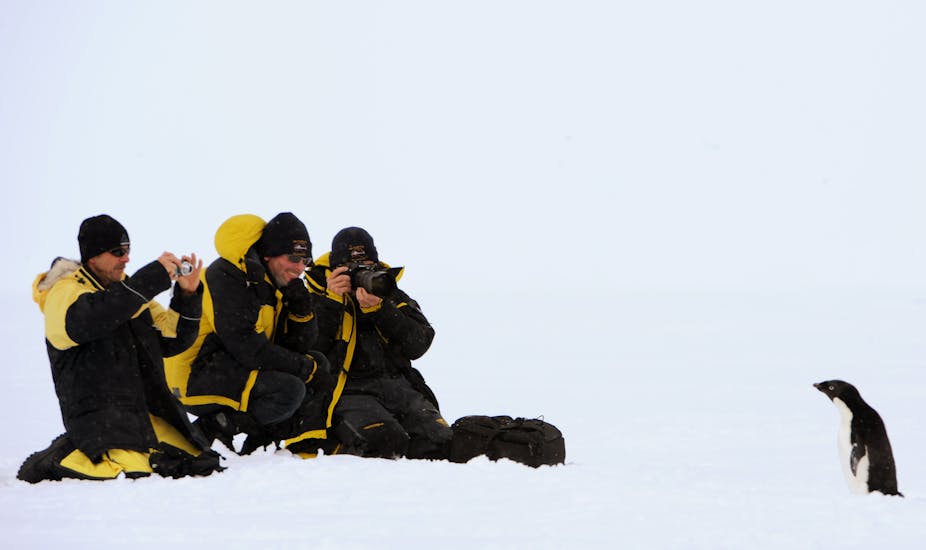Everyone is looking at Antarctica right now: attention at last! The 100th anniversary of Douglas Mawson’s landing at Commonwealth Bay in Antarctica arrived and passed without the promised celebration, thanks to B9B (a massive iceberg blocking the ship). But still satellite TV news lets us bask nightly in the reflected glory of Antarctic explorers past.
Anniversaries, whales and too many campers
Australians’ anniversary actions echo similar ones by the Norwegians, the British and seemingly every country with polar interests. The Norwegians went to extraordinary lengths to celebrate, sending the head of their polar research institute to ski across Antarctica. They flew a planeload of people, including the Prime Minister, to the South Pole to celebrate their national hero Roald Amundsen’s annihilation of the British in 1911. Think national identity and you won’t be too far wrong.
I’ve lost count of the number of “recreation” or “legacy” expeditions and reality TV shows that have suddenly discovered Antarctica. They number in the hundreds, all linked to the world 24 hours a day via sat phones and live streams. The Americans who run the South Pole base have had to instigate special rules to cope with all the campers. It’s like an Australian beach caravan park in January.

Simultaneously, according to newspapers in Australia and Japan, a war is apparently being raged in the Southern Ocean over scarce, large and intelligent inhabitants: whales. Right or wrong, the waters seem to get hotter each year, the end-game closer.
Does all this matter, or is this Antarctic excitement just a blip on the news wires? Antarctic watchers could be excused for throwing up their hands at the triviality of the analysis. They know the short-term media attention will drift away in weeks, if not days.
Mining Antarctica?
There is no doubt, however, that things are happening south of 60°. What is not clear yet is which direction events will take us, and whether Antarctica will remain forever the strongly protected common heritage of humankind, or become the global quarry of the 21st century.
There are efforts to ensure that the latter never occurs. On the 20th anniversary of the most important international environmental agreement ever signed, the Madrid Protocol to the Antarctic Treaty, the two architects Michel Rocard (former prime minister of France) and Bob Hawke issued a declaration. It was naturally ignored by the bulk of the Australian media.
The declaration calls for all nations with Antarctic interests to ratify the Madrid Protocol as soon as possible. This would effectively put natural resource exploitation off the agenda for the foreseeable future. Fourteen of the countries that have signed the Antarctic Treaty have not ratified the Madrid Protocol, including seven European nations and four Latin American ones.

Off the record, some countries will tell you they haven’t signed because they don’t want to accept liability when their citizens damage Antarctica’s heritage or environment. Given their legal commitments under the Antarctic Treaty and other international law, this is simply gross irresponsibility.
Australia and France said at the time that they would help to encourage further ratifications. But there has been little public evidence of progress to date. France at least has instigated the first prosecution in support of the Madrid Protocol liability annex: prosecuting our vandals is something we do at home, so why not when they commit crimes in Antarctica? It is surely in Australia’s interests to robustly encourage ratification of a protocol which protects our own self-declared objectives.
Stirring the pot even more deeply are a range of countries including Russia and China, and bizarrely last week, Iran. Iran, not a signatory to the Antarctic Treaty, announced a major “six-step program” to build a base and icebreaker for Antarctic research.
Russia announced last year that it would begin a major program of mineral and hydrocarbon exploration in Antarctica. It may have caused a few raised eyebrows among delegates to the Antarctic Treaty Consultative Meeting, but nobody blinked. Acceptance of this and similar programs by Australia and other Consultative Parties may have consequences. It could signal the beginning of a slow decline of the protection of Antarctica: the moral high ground has been lost.

Recently, some have suggested promoting the World Heritage listing of all or major chunks of Antarctica to give the continent greater protection. While largely symbolic, this would help to deter those interested in resource exploitation and raise public awareness and sympathy for a very special place.
Importantly it would open the debate about protection and status of Antarctica to a much wider community of nations. There is no doubt the idea will arouse fierce objections from bureaucrats in several traditional Antarctic countries like Australia. They have seen attacks on the ATS “club” by developing countries in past decades, not always for altruistic reasons. The status quo often seems the best solution to those who created the system. Politicians however do not always agree with the bureaucrats who serve them.
This year’s “shopping basket” of events and declarations may be more than happenstance. Beyond the anniversaries they may indicate a shift in thinking and attitudes towards Antarctica. Let’s hope the ensuing debate inherits the wisdom of past thinking about this glorious continent. Australia could, if it is interested, play a leading role in such a debate.

